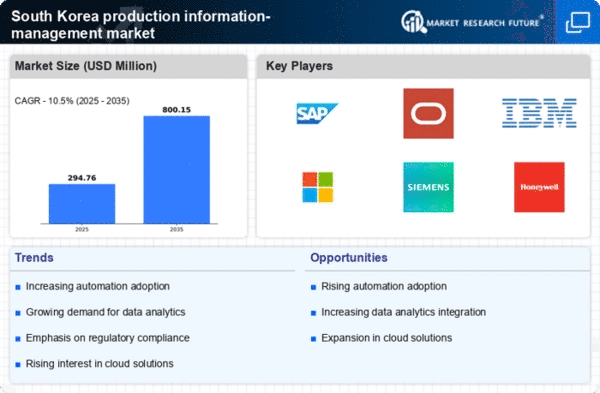Rising Demand for Customization
In the production information-management market, the increasing demand for product customization is a key driver. South Korean consumers are increasingly seeking personalized products, prompting manufacturers to adopt flexible production systems. This shift necessitates advanced information management solutions that can handle complex data related to customer preferences and production specifications. As a result, companies are investing in systems that allow for real-time adjustments in production processes. The market is projected to grow by 5% annually as manufacturers seek to enhance their responsiveness to consumer demands, thereby driving the adoption of innovative information management technologies.
Focus on Data Security and Privacy
Data security and privacy concerns are emerging as significant drivers in the production information-management market. With the increasing digitization of manufacturing processes, the risk of data breaches has escalated. South Korean manufacturers are prioritizing the implementation of robust security measures to protect sensitive production data. This focus on data integrity and confidentiality is likely to drive investments in advanced information management systems that offer enhanced security features. As companies seek to safeguard their operations, the market is expected to grow by approximately 4% annually, reflecting the critical importance of data security in production management.
Regulatory Compliance and Standards
The production information-management market is significantly influenced by the need for compliance with stringent regulatory standards in South Korea. The government has implemented various regulations aimed at ensuring quality and safety in manufacturing processes. For instance, adherence to ISO standards is mandatory for many industries, which necessitates robust information management systems to track compliance. This regulatory landscape creates a pressing need for production information-management solutions that can efficiently manage documentation and reporting. As companies strive to meet these requirements, the market for production information-management systems is expected to expand, with an estimated growth rate of 6% annually.
Integration of Supply Chain Management
The integration of supply chain management with production information-management systems is becoming increasingly vital in South Korea. As companies strive for operational efficiency, the need for seamless communication across the supply chain is paramount. This integration allows for better inventory management, demand forecasting, and production scheduling. The production information-management market is likely to benefit from this trend, with an anticipated growth rate of 7% over the next five years. Enhanced visibility and control over the supply chain can lead to reduced costs and improved service levels, making it a critical focus for manufacturers.
Technological Advancements in Manufacturing
The production information-management market is experiencing a surge due to rapid technological advancements in manufacturing processes. Automation and smart technologies are being integrated into production lines, enhancing efficiency and reducing operational costs. In South Korea, the manufacturing sector is projected to grow at a CAGR of 4.5% from 2025 to 2030, driven by innovations such as IoT and AI. These technologies facilitate real-time data collection and analysis, which are crucial for effective production management. As manufacturers increasingly adopt these technologies, the demand for sophisticated information management systems is likely to rise, thereby propelling the market forward.

















Leave a Comment